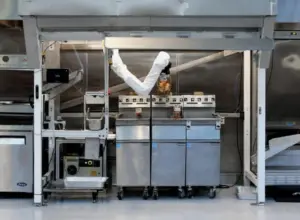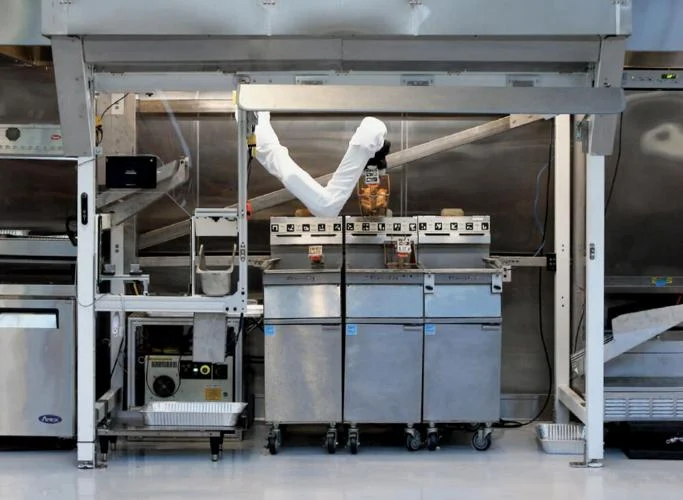The first McDonald’s primarily run using robotics debuted in Fort Worth, Texas, last March with much fanfare and anticipation. News cameras recorded the action inside while reporters interviewed customers outside to get their take on what will likely be the next big revolution in fast-food restaurants.
Machines handled nearly everything. The McDonald’s of the future went online without cashiers or anyone onsite to take orders. Customers placed their pickup orders by either kiosks or app. Big Macs and fries were prepared by computer-directed devices. Pickup orders were delivered to customers via a conveyor belt.
Humans weren’t totally absent, however. A few workers helped prepare online orders in advance and kept watch over their automated coworkers to ensure they were operating correctly.

Flippy 2 in action at the Miso Robotics lab. The robot is programmed to fry items from French fries to chicken nuggets and works alongside humans in the restaurant.
All in all, the unveiling of the technologically advanced McDonald’s was hailed as a successful demonstration of the speed, accuracy and efficiency of restaurant automation and as a major step forward in the advancement of restaurant robotics.
McDonald’s is just one franchisor investing millions of dollars in new technology. The investments are driven mainly by economics, namely a tighter labor market and rising minimum wages. Chipotle Mexican Grill is using robots to prepare food, while Chick-fil-A launched autonomous delivery in Alpharetta, Georgia, and Austin, Texas, in 2023.
Buffet franchise Golden Corral is testing food serving robots from Richtech Robotics to streamline food delivery in the restaurant and handle tasks such as taking dishes to the dishwasher. Wendy’s is also experimenting with autonomous robots to transport meals underground to car-side pickup portals in seconds.
Travis Kalanick, the former CEO of Uber and founder of CloudKitchens, announced in December his new venture, Lab37, will invest in automated technology for use in restaurants.
“Driven by our passionate chefs and the nerdy engineer mindset, we created a food lab to build automation tools that can help the restaurant operator deliver tastiness, authenticity, and everyday convenience all while making a better living doing it,” Lab37 said in a statement on its website. Lab37 is a restaurant tools and technology company which researches and launches new brand concepts. CloudKitchens is a ghost kitchen development company.
Restaurant automation is inevitable, experts say. “No matter how you feel about, robotics in restaurants is coming and, when it does, it’s going to change the entire industry,” said Jim Collins, president of Perfect Company, which works with restaurants to automate their kitchens.

David Bloom is the chief operating and development officer at Wing Zone and Capriotti’s.
“But as much as we’ve seen a lot of incredible advancements made in the technology in recent years, the truth is we’re still years away from seeing it take over the industry,” he added. “There are just too many challenges, issues remaining in the technology that need to be resolved.”
Collins, a technology industry veteran turned restaurant innovator, is the former CEO of ghost kitchen pioneer Kitchen United. He said we are “likely a decade” or so away from robotics becoming mainstream in quick-service restaurants.
“Robots and their arms need a footprint, a certain amount of space to operate in,” said Collins, “and to install them into existing restaurant kitchens is going to be a costly retrofit.”
“But the other big challenge for restaurants, probably the biggest one, is just getting robots to do what they need to do in kitchens,” he continued. “It’s not as easy as it sounds to get a robot to do even the simple things like prepare French fries or flip burgers. It turns out that the things we thought were easy for robots to do are actually hard things for them to do because we have trained customers to order their food exactly the way they want it. Robots have a hard time customizing orders.”
Testing still underway
Despite the hurdles in restaurant robotics, many bigger fast food and fast casual brands remain committed to advancing the technology. Panera Bread dove headfirst into drive-thru automation at the end of 2022 with the announcement of its partnership with OpenCity to test AI voice ordering technology in two café locations in Rochester, New York. The company also tested a coffee-brewing robot in partnership with Miso Robotics earlier in the year.
Miso, one of the leaders in advancing food prep robotics, garnered a lot of attention from restaurant groups in 2017 when it first came out with Flippy, a robot that can be programmed to flip burgers or make chicken wings.
Burger chain White Castle installed Flippy at four of its restaurants and committed to adding the technology to 100 stores as it revamps locations. Chipotle, meanwhile, began testing the Miso equipment, which it calls “Chippy,” at a California restaurant to make tortilla chips.
“The highest value benefit that we bring to a restaurant is not to reduce their expenses, but to allow them to sell more and generate a profit,” Miso CEO Mike Bell told CNBC.
At Wing Zone and Buffalo Wild Wings, however, Flippy never made it past the testing phase after more than a year. Buffalo Wild Wings’ parent company Inspire Brands—which is privately held and also owns several other brands including Dunkin’, Arby’s and Sonic—said Miso is just one of the partners it has worked with to automate frying chicken wings.
In June 2022, when Miso first announced a partnership with Wing Zone, the Atlanta-based chain said it would make the latest version of the robot “a part of the chain’s standard build for all future restaurant locations.”

Perfect Company President Jim Collins says we’re still years away from seeing robotics become mainstream in restaurants.
But now, Wing Zone and Capriotti’s are pausing robotics initiatives as they wait for further advancements in the technology. David Bloom, chief operating and development officer at Wing Zone and Capriotti’s, said the brands need more proof of economic viability before pouring more money into kitchen testing.
Bloom said Wing Zone and Capriotti’s are still committed to eventually integrating robotics into food operations and are keeping a close eye on the newer iterations of the technology that allow robotic arms to become more flexible, more mobile and as he put it “more condensed.”
“Down the road we anticipate more pilot testing of the technology and will be ready to pull the trigger on it when we are convinced it’s ready for primetime,” he said, with energy this year instead focused on “traditional growth strategies.”
Jamba, part of Focus Brands, made a similar decision after introducing automated smoothie kiosks in 2020 as part of a deal with Blendid. “We aren’t focused on that particular workstream any longer,” a Jamba spokesperson told Franchise Times.
Meanwhile, McDonald’s remains committed to moving forward on automation. The debut of that first robotics-operated McDonald’s outlet was quickly followed by another in Denver.
“It’s a fascinating field and they’re moving fast to improve the technology,” Collins said, “but, at the same time, they’re still a long way away from figuring it all out.”
This article originally appeared in the February 2024 issue of Franchise Times, a sibling publication to Food On Demand.


